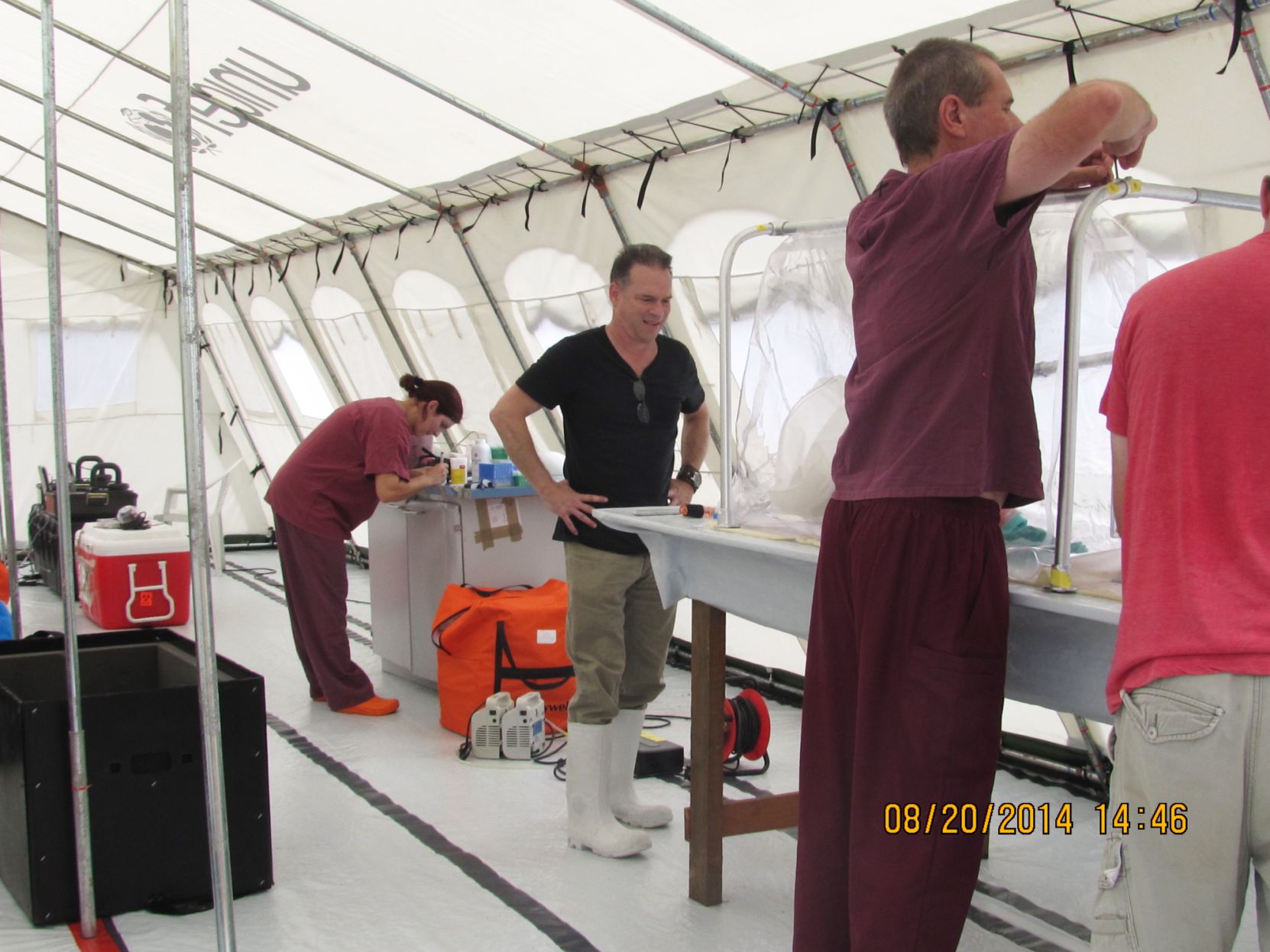Arbor Day Tree Giveaway
December 23, 2014
Boys and their Toys
January 2, 20151. Ebola Offshore
As global health workers struggled to contain deadly epidemic of Ebola virus on the African continent, local oilfield companies, their workers and agencies that govern them kept a close eye as well.
No Ebola cases involving local workers assigned to West Africa had been reported as of press time, but risks to worker health, economic costs for companies and potential liability pitfalls were reasons for concern, company representatives, attorneys and government officials acknowledged.
West African nations are among the places where vessels, rigs and some labor from some local oilfield service companies are utilized for support of oil and gas exploration.
A handful of workers for local companies told The Times they had experienced heightened scrutiny while working at African ports.
“Every day on the boat they took our temperature,” said a Lafourche Parish worker who recently returned from Nigeria. “There were signs all over that if you feel sick or have bleeding tell a medic.”
Interviews with federal officials and other research indicated that that U.S. maritime operations – particularly those operating in West Africa – have an elevated cause for vigilance.
The Coast Guard said it would check ship records to determine whether any of a vessel’s last five port calls were in the three nations listed by the Centers for Disease Control and Prevention.
– By JOHN DeSANTIS
2. Local leaders praise judge’s BP ruling
A federal judge’s ruling that BP was “grossly negligent” in its actions prior to the 2010 Deepwater Horizon blowout, which laid one of the worst environmental disasters in history on Louisiana’s doorstep, was hailed by environmental organizations and politicians from both parties as an important step in the process of accountability.
Despite its detail and sheer physical heft, however, District Judge Carl Barbier’s decision is still one piece of the reparation puzzle, and while it makes clear who shares how much fault, how that translates into dollars for businesses that suffered remains to be seen.
This ruling’s chief effect is a better sense of how much BP will have to pay out in fines, once the amount of oil discharged from its runaway well is determined. Fines could reach $4,300 per barrel of oil spilled, amounting to somewhere between $10 billion and $17 billion.
BP strongly disagreed with the decision issued and said it would appeal.
Despite the appeal, community leaders and lawmakers indicated to The Times that they strongly believe Barbier’s finding will stick.
The federal RESTORE Act, a bipartisan measure written by outgoing Sen. Mary Landrieu (D-La.) and Sen. Richard Shelby (R-Ala.) provides that a hefty portion of the penalties will be used to rebuild badly eroded coastal areas.
– By JOHN DeSANTIS
3. Countdown to National healthcare enrollment deadline
The deadline for individuals to enroll in a 2014-health insurance plan via Affordable Care Act-act exchanges was March 31, but hundreds of thousands of Louisiana residents remained uninsured in the early part of 2014.
Reports were mixed as to whether “Obamacare” aids or ails consumers’ pocketbooks, but most who remained uninsured after March 31 paid penalties for continuing to live outside the system Congress voted to revamp in 2010.
Monica Folse is certified to guide people through the exchange and owns the brokerage Houma Health Insurance Service.
For those Folse had assisted as of January, the cost of insurance had been greater than some expected and multiple applicants decided to forgo coverage even though they’d have to pay a financial penalty.
“The prices are much more expensive than what they have been [even with government assistance,” Folse said. “It seems as though there are some people who have decided not to do anything.”
Additionally, glitches with the website healthcare.gov prevented Folse from enrolling the people she helped guide through the process.
Federal officials cited website issues for the suppressed number of those who had signed up for insurance via the exchanges.
– By ERIC BESSON
4. Edison Chouest ship captain recounts 18 days in captivity for gCaptain
While stashed away in a Nigerian swamp swamp, the American hostage Capt. Wren Thomas III ate one park of instant noodles every day while his captors smoked crack and brandished loaded firearms. This went on from 18 days.
Thomas, who was kidnapped in late October, 2014, off the Edison Chouest Offshore supply vessel the C-Retriever along with the ship’s chief engineer, shared his story with gCaptain, a popular maritime and offshore industry website.
“They treated us like animals,” Thomas, an Illinois native, told gCaptain for a story published April 4. “It’s about as close as a person could get to being a POW Some of them were particularly cruel to us. The stifling air was filled with smoke from crack and pot the entire time. … They fought with each other the entire time, the would chamber rounds on each other and they would beat each other.”
Thomas had received no special training for precautions related to Nigerian territory or pirates, he told the website.
For roughly two months after his rescue, secured for a ransom, Thomas received no offer of aid from Cut Off-based Edison Chouest Offshore, he told gCaptain.
“No one ever offered me an opportunity to visit a doctor or retrieve any counseling or psychiatric help, let alone to pay for such treatment or meds,” Thomas said.
In January, ECO offered to pay for medical expenses provided Thomas turn over his records to the company, he added.
The full story is online at gcaptain.com.
– By ERIC BESSON
5. Studies show Oil & Gas booming in Louisiana, Port Fourchon
Months before releasing an economic study regarding the importance of oil and gas to Port Fourchon, Dr. Loren Scott presented the findings of a separate but related study to the South Central Industrial Association’s annual general membership meeting in July.
Included in his study entitled “The Energy Sector: Still a Giant Economic Engine for the Louisiana Economy” were data detailing how many direct jobs per parish are associated with oil and gas extraction, support activities, petroleum refining and pipeline industries, the average annual wages those jobs command.
Terrebonne ranked second in the state with 6,070 energy jobs, and Lafourche had 1,511, according to Scott.
In a separate study conducted by Scott’s team released months later, the number of jobs directly related to Port Fourchon – 10,804 – was more than the total employment of 30 other parishes in the state. Additionally, for every one job created in Port Fourchon, another 5.2 jobs are created elsewhere in the state’s economy to support it.
The study found that one out of every 13 jobs in Terrebonne and Lafourche parishes is directly related to the existence of Port Fourchon.
On the flip side, more than $11.2 billion in business sales, more than $3.1 billion in household earnings and more than 65,000 jobs would be lost if the port was out of service for just a three-week period.
– By ERIC BESSON
and RICHARD FISCHER
6. Lawsuits threaten oil and gas boom
Lawsuit abuse was destroying the oil and gas industry from an exploration and production standpoint in the state of Louisiana, according to a trade organization.
Gifford Briggs, vice president of the Louisiana Oil and Gas Association, asked for community support with a grassroots campaign to stand up against what it called frivolous lawsuits preventing the state from achieving its full potential in the oil and gas industry.
As of September 2013, the number of legacy, flood protection authority and coastal lawsuits numbered more than 386 in Louisiana.
Briggs said no other state in the country suffers from these types of lawsuits, and only one country in the world has similar lawsuits.
In additional to many legacy lawsuits, the biggest legal cloud hanging over the industry is the Southeast Louisiana Flood Protection Authority-East’s lawsuit versus 97 oil, gas and pipeline companies.
The board claims years of drilling and dredging for oil and gas has contributed to the loss of coastal wetlands that serve as a hurricane buffer for New Orleans and the surrounding regions.
Opponents of the suit claim the potential loss of business to other areas of the country may be a negative consequence of the suit.
Gov. Bobby Jindal and the Louisiana legislature have made their opposition to the suit clear as it remains on the books but in political limbo.
– By CHANNING PARFAIT
and RICHARD FISCHER
7. Task force weighs in to teacher pay raise debate
The Terrebonne Parish School Board presented voters with a sales-tax referendum to fund pay raised for public school teachers and support staff.
With the support of the Terrebonne Public Schools Community Task Force – a group jointly created by the school board and Houma-Terrebonne Chamber of Commerce – the measure passed by an overwhelming 58 to 42 percent margin in the Dec. 6 election.
This victory came roughly a year after an effort to increase teacher salaries through a millage increase failed overwhelmingly without the support of the chamber.
The pay hike is expected to allow the school district to attract and retain quality educators. Terrebonne Parish had 60 teaching vacancies at one point during the 2013-14 school year and had more than 82 uncertified teachers in the classroom at the beginning of the 2014-15 school year. The approval of the tax will make for Terrebonne teachers’ first raise on the local level since 2007 as it’s starting teacher salary was $37,909 – 47th among Louisiana’s 69 school districts.
The raise will bump Terrebonne into the top third by raising teacher salaries by about $5,000 and staff salaries by about $2,000.
“The winners in this are right at 19,000 children,” said Superintendent of Schools Philip Martin. “Those are the real winners, the real beneficiaries of all of this, and at the heart of this that is what it is all about.”
– By ERIC BESSON
and JOHN DESANTIS
8. New law creates statewide ports, transportation berth
Ports, terminals and railroads – along with air transportation – got what many business leaders say is a needed boost for the future, with the creating of a new state agency to assist them.
Ports and related facilities have all been under the direct aegis of Louisiana’s Department of Transportation and Development.
But state Sen. Norby Chabert, R-Houma, is among officials who agree that while DOTD has done its best to accommodate the needs of ports and other elements of the “Multi-modal” transportation structure, a sub-agency dedicated to their well-being would go a long way toward better helping them grow and prosper.
Gov. Bobby Jindal has signed Chabert’s bill, SB 573, into law.
Its result, Act. No. 719 of the 2014 Regular Session of the Louisiana Legislature, establishes an Office of Multimodal Commerce and creates a Commissioner of Multimodal Commerce.
The new law keeps ports and other facilities under DOTD control. But the appointment of a commissioner whose sole responsibility is ports and related matters means future development projects will jump through fewer bureaucratic hoops, supporters say.
– By JOHN DESANTIS
9. Louisiana’s netting millions on gaming, but where is it going?
While funding for education in Louisiana continues to suffer, the gaming industry continues to grow from its own profit, with a minimal amount of those funds directed to improve the overall well being of the state.
In Terrebonne Parish, video gaming for fiscal year 2011-12 generated net revenue of $46.8 million from 1,000 gaming devices. In Lafourche parish during the same time, net revenue totaled $32.8 million from 875 devices in the parish.
State Rep. Joe Harrison, R-Gray, proposed legislating during this past session that would afford more of this money to education, bus as in years’ past, his bills against the gaming industry were deferred.
Harrison said a “well-funded education system” is what residents of Louisiana expected when gaming was approved in the early 1990s, and he believes his bills are continually deferred because of the strength lobbyists have related to gaming, particularly in horse racing.
Fro the horse racing industry’s $890 million in revenue, only $200 million is set aside for education, Harrison said.
As for the Louisiana Lottery, it transfers 35 percent of its revenue to the state treasury, and lottery communications manager Kimberly Chopin said this is among the highest percentages in the nation.
– By CHANNING PARFAIT
10. Court OKs injection well for residential neighborhood
The Louisiana Supreme Court has cleared the way for a contested oilfield waste injection well project near downtown Houma to proceed over community objections, angering residents who fear the environmental consequences.
Local government officials say the move creates a dangerous precedent by stripping localities of the power to regulate oil and gas facilities within their jurisdictions and have vowed to fight state laws upon which the court decisions were based.
At issue is a finding by the 1st Circuit Court of Appeal that a parish ordinance requiring a 1-mile buffer zone between injection wells and homes, churches or schools violates state constitution and contradicts specific state statutes.
In most matters of zoning and permits, Louisiana has historically yielded to local desires. But the case of Vanguard Environmental LLC vs. Terrebonne Parish takes state control to a new extreme, government officials and environmental advocates maintain.
The well proposed for constriction is located near the point where Williams Avenue meets North Hollywood Road. The well location is within a mile of St. Gregory Barbarigo Church and its school as well as Legion Park Elementary School, several recreation fields and various single-family homes.
At the crux of the argument is Louisiana’s classification of oilfield waste as non-hazardous, thanks to a wide loophole in federal law that lets states individually set the bar for what is regarded as hazardous and what is not.
– By JOHN DeSANTIS
















